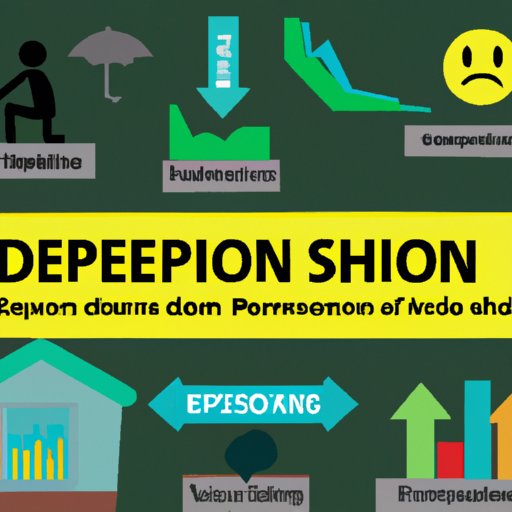
I. Introduction
Depression is a common mental health condition that affects millions of people worldwide. Recognizing the signs and symptoms of depression is crucial for effective treatment. Depression can affect anyone regardless of age, gender, or socio-economic background, and it can have serious consequences if left untreated. In this article, we will explore the signs and symptoms of depression, warning signs, triggers, and strategies for coping with depression symptoms.
II. Understanding the Commonality of Depression Symptoms
Depression is a universal condition that can affect people of all ages, genders, and socio-economic levels. However, some factors can increase the risk of depression in certain groups:
A. Age: Older adults are more likely to experience depression due to life transitions, chronic illnesses, and isolation.
B. Gender: Women are more likely to experience depression than men, which may be due to biological, social, and cultural factors such as hormonal changes and societal expectations.
C. Socio-economic levels: Individuals with lower socio-economic status are more likely to experience depression due to financial stress, lack of access to resources, and exposure to adverse life events.
III. Physical and Mental Symptoms of Depression
Depression affects both physical and mental health. The following symptoms may indicate depression:
A. Changes in appetite: Depression can cause changes in appetite, leading to weight gain or loss.
B. Insomnia or change in sleep patterns: Depression can disrupt sleeping patterns, leading to difficulty falling asleep, staying asleep, or oversleeping.
C. Hopelessness, sadness, and despair: Depression can cause feelings of sadness, hopelessness, and despair that persist for weeks or months.
D. Fatigue and loss of energy: Depression can lead to fatigue, lack of energy, and reduced motivation to engage in daily activities.
IV. Warning Signs of Depression
Depression warning signs may indicate a need for immediate intervention and care. The following are warning signs of depression:
A. Withdrawal and isolation: Depression can cause people to withdraw from social activities, avoid friends and family, and become isolated.
B. Loss of interest in activities: Depression can cause people to lose interest in activities they previously enjoyed, such as hobbies or sports.
C. Difficulty concentrating or making decisions: Depression can affect concentration, memory, and decision-making, leading to impaired academic or work performance.
D. Thoughts of suicide: Depression can lead to thoughts of suicide, which require immediate medical attention.
V. Triggers of Depression
Depression can be triggered by various factors, including:
A. Life changes, such as loss of loved ones or jobs: Significant life events, such as bereavement, marital problems, or loss of employment, can trigger depression.
B. Chronic stress from work or relationships: Prolonged exposure to stressors such as work pressure or unhealthy relationships can trigger depression.
C. Physical illnesses or medical conditions: Chronic physical illnesses such as cancer, heart disease, or diabetes can trigger depression, as can medical conditions affecting brain function, such as Parkinson’s or Alzheimer’s disease.
VI. Strategies for Coping with Depression Symptoms
Effective strategies for coping with depression symptoms include:
A. Self-help strategies, such as exercise and relaxation techniques: Exercise, diet, and other self-care habits can improve depression symptoms and enhance overall health and well-being.
B. Seeking professional help, such as therapy and medication: Professional intervention, such as therapy, medication, or a combination of both, can enhance recovery and reduce the severity of depression symptoms.
C. Support from family and friends: Support from loved ones and a strong social network can help individuals cope with depression and reduce the risk of relapse.
VII. Conclusion
Depression is a common mental health condition that can affect anyone regardless of age, gender, or socio-economic status. Recognizing the signs and symptoms of depression, including physical and emotional symptoms, warning signs, and triggers, is essential for effective treatment and prevention of future episodes. Strategies such as self-help, seeking professional help, and support from family and friends can help individuals manage depression symptoms and improve overall well-being. Seeking help is a courageous step towards recovery, and hope and healing are possible.




